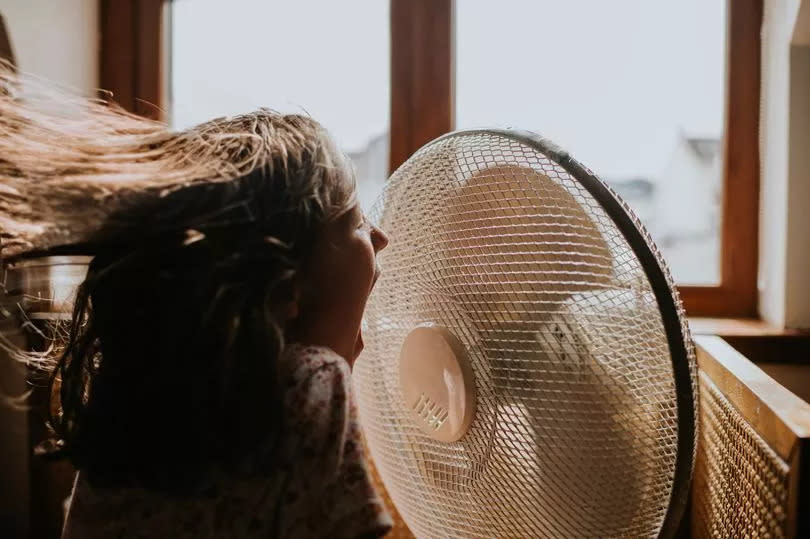Expert explains 'life-threatening' reason not to use fans as heat to reach 22C

One expert has warned people not to use their fan overnight this summer as it can lead to some deadly consequences.
As the Met Office predicts highs of 22C across Scotland this weekend, many people will be lugging the electric fans out of the cupboard and setting them up for a cool breeze throughout the home. According to Gov.uk research, 43 per cent of all UK households already use an electric fan on the regular.
However Andrai Carcu, an electric appliance expert from Emergency Electrics and Heating 24-7, has revealed that keeping a fan on overnight can be fatal for Brits - including catching fire.
The expert said: "Sleeping during the summer can be a struggle, let alone if there is a heatwave, which is why so many of us opt to use a fan at night. Although it might make you feel cooler and help you sleep easier, it is not without its dangers, some of which can be life-threatening."
Read on below for Andrai's four reasons why you should never keep a fan on overnight in the home, reports Bristol Live.
Four reasons you should never use a fan overnight
1. Dust can cause the fan to catch fire
The expert said: "A buildup of dust can be a serious problem for your electric fan, as it might accumulate in the fan’s motor. This will lead it to overheat and potentially catch fire.
"However, this is easily avoidable by regularly cleaning your fan, particularly the blades, the vent and the motor if possible to remove any buildup of dust. Before tackling the fan itself, always disconnect the device and adhere to the manufacturer’s guidelines in the manual."
2. The fan could be spreading allergens

Andrai said: "Electric fans are supposed to circulate air around the room but dusty fan blades allow dust mites, spores, pollen and other allergens to also disperse in the area.
"Frequent sneezing, watery eyes, a runny nose, itchy throat, or difficulty breathing are all signs that you could be spreading allergens around the room without realising it. Regularly deep cleaning your bedroom can help rid the amount of dust and allergens that are circulating your room."
3. Dry air can result in congestion
The expert also noted that leaving the fan on constantly can dry out the air and make your throat dry and sore. Andrai continued: "If you leave your fan on continuously throughout the day, the air can become dry due to the constant airflow, which in turn will dry out your nose and throat.
"Your body will try to maintain hydration by producing more mucus but this can lead to uncomfortable sensations like sinus headaches, nasal congestion, drowsiness and fatigue. You can avoid this by drinking at least 2 litres of water a day which will also help you sleep easier."
4. Air from the fan can lead to muscle cramps
Andrai also said that if you keep your fan directed towards your body then it can trigger pain and cramping in your muscles. He added: "Directing your electric fan towards you can exacerbate muscle pain, as the cool air is more likely to build up tension and trigger cramping in your muscles.
"This is why you are more likely to wake up with a stiff neck if you have your fan on all night. You can avoid this by simply making sure the fan is not facing you directly, or use an electric rotating fan that will not constantly disperse cool air to your body."
How to use your fan safely
Andrai started off by warning people to never leave their fan on overnight. He said: "If you allow your fan to circulate overnight, any electrical fault in the machinery can cause a fire without you realising."
Then, the expert told people they should be cleaning their fan regularly. Andrai said: "Unplug the fan from the wall and remove any dust from the blades, motor and vent to avoid the electric fan from overheating. Also, keep it away from curtains to ensure any fire caused by the fan doesn’t spread."
Andrai also warned people to be aware of any 'buzzing' sounds coming from the fan, as he added: "If you hear your electric fan buzzing, it may be a result of an electrical fault or your plug ‘arcing’ at the wall, caused by an overloaded outlet or loose connection. Make sure your fan is plugged in securely and remove it from the wall immediately if the buzzing continues."
You should also never buy fans second-hand, the expert warns. Andrai said: "Buying your fan via Facebook Marketplace or eBay means that it hasn’t had the same safety testing as it would from an official retailer, increasing the likelihood of an electric shock or fire."
And finally, Andrai told people to always place their fan on a flat surface, noting: "If you place your fan on the edge and it happens to fall on its face, the blades’ movements may become restricted, forcing additional strain on the motor which can lead it to overheat and potentially catch fire."
How to stay cool at night without a fan

Close your curtains - Andrai said: "Block out sunlight by keeping your blinds and curtains closed during the day or use blackout curtains to keep your room cool."
Swap out your pyjamas and sheets - The expert said: "Wear pyjamas with natural fabric like cotton and linen that let your body breathe and swap out your regular bed sheets for ones made of bamboo or linen."
Take a cool shower or bath - Andrai continued: "Take a cool shower or bath approximately an hour before bedtime which will lower your body’s temperature and help you sleep more easily."
Drink lots of cold water - The expert noted: "Drink plenty of cool water throughout the day, especially before going to bed which will help you regulate your body’s temperature."
Target cooling areas on your body - Andrai added: "Drink plenty of cool water throughout the day, especially before going to bed which will help you regulate your body’s temperature."
Don't miss the latest news from around Scotland and beyond - Sign up to our newsletter here.

 Yahoo News
Yahoo News 
